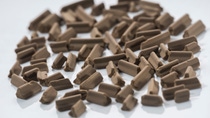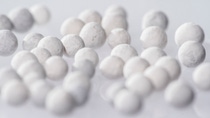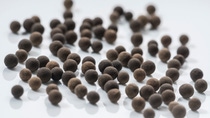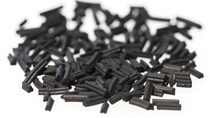PuriCycle® for Chemical Recycling
PuriCycle® – enabling plastics circularity
BASF offers advanced high-performance catalysts and adsorbents for purification of waste plastics pyrolysis feeds.
PuriCycle® portfolio encompasses novel catalysts and adsorbents developed to selectively remove or convert wide range of impurities and enable downstream processing of circular plastics streams.
Plastic waste represents a fundamental issue not only to the environment but also to the chemical industry as the search for sustainable value chains with reduced dependency on fossil feedstocks reactivates. BASF is committed to contribute to solutions that help solve the challenge of plastic waste. Building a circular economy for plastics requires innovation and joint efforts across the value chain.
Why BASF?
Relying on vast expertise in process catalysis and materials, BASF introduced a new line of products designed to purify most complex plastics recycling streams to ensure full compositional compliance with industry standards. The PuriCycle® portfolio encompasses novel catalysts and adsorbents developed to purify waste streams to enable circular processing of plastics.

Chemical Recycling of Waste Plastics
Chemical or monomer recycling is a highly promising method to convert polymers to original monomers by using thermal processing. Pyrolysis is a well-known technology that is already established in certain areas and has been successfully used to turn waste plastics into naphtha, the preferred feedstock for the production of virgin olefins in modern petrochemical industry. Waste plastics based pyrolysis naphtha is often contaminated and requires clean up to be qualified for further processing into olefins.
Selective Hydrogenation
Our offering: PuriCycle® SH
Plastics pyrolysis feeds generated by thermal non catalytic or catalytic pyrolysis processes normally contain high amounts of unsaturated compounds, often up to 50-60 wt % of olefins and up to 4-5 wt % of diolefins depending on the specificity of the process. While olefin saturation can be completed downstream in a hydroprocessing unit, heating up streams containing high levels of polyunsaturates i.e. diolefins is a challenge as these compounds tend to oligomerize and condense into waxes contributing to coking of heat exchangers. At certain elevated levels diolefins pose a problem for transportation of pyrolysis liquids making them less stable. BASF offers PuriCycle® SH products for selective prehydrogenation of plastics pyrolysis feeds to remove polyunsaturated compounds enabling transportation and/or downstream processing.
Metals Removal
Our offering: PuriCycle® M
High levels of metals are often found in waste plastics pyrolysis feeds. Some of them are very challenging to remove with conventional process options being costly and equipment intensive. Metals in pyrolysis streams substantially limit downstream process options. PuriCycle® M guards offer exceptional performance for eliminating some of the most difficult to remove metals i.e. Si.
Dechlorination
Our offering: PuriCycle® H, PuriCycle® HB
Halogens and more specifically chlorides are often present in waste plastics pyrolysis streams. The levels vary greatly depending on the types of plastics used, preprocessing configuration and overall process design. Removal of halogens is important to protect downstream equipment. BASF offers PuriCycle® H in a nonregenerable service, an adsorbent which efficiently and selectively binds halogens ensuring the highest purity of the product stream.
Hydroprocessing
Our offering: PuriCycle® HPF1, PuriCycle® HPF5
Immense diversity among compositions of plastics pyrolysis liquids result in a wide spectrum of related impurities. Most plastics pyrolysis feeds are rich in unsaturated compounds, aromatics and often include -N, -O, and -S compounds as well as traces of metals such as Si, Hg and others. Depending on the downstream use of these streams there are different purity and compositional requirements. Feeding steam crackers, which is widely seen as the most feasible route to close the plastics loop, requires plastics derived feeds that satisfy stringent purity specs. Hydroprocessing is often viewed as the preferred universal process solution to hydrogenate unsaturated compounds and simultaneously remove heteroatoms such as -N, -O, and -S. BASF offers a range of PuriCycle® HP products as efficient hydroprocessing catalysts optimized for high performance in plastics pyrolysis liquids.
Recycling of Waste Plastics using Solvent-based Recycling
Solvent-based recycling of waste plastics is an elegant method to recover the virgin polymer. This type of recycling method uses a selective solvent to dissolve a polymer recovering plastics of suitable quality for reuse. Saturated solvents normally require purification due to presence of pigments, dyes and other contaminants typical for plastics. BASF PuriCycle® L and LN adsorbents are perfectly suited to purify streams originating from solvent based recycling processes i.e. solvolysis, glycolysis et. These are engineered high performance adsorbents featuring designed pore size distribution and high robustness under process conditions enabling exceptional performance.
Decontamination
Our offering: PuriCycle® L, PuriCycle® LN
We offer activated alumina adsorbents for initial discoloration in plastics recycling feeds. The granular and spherical alumina adsorbents have a high mechanical strength combined with high surface area and engineered pore structure that provide a unique set of properties needed for initial decontamination and color removal.
Publications
Purifying and upgrading of waste plastics pyrolysis oils
Closing the plastics production disposal loop requires the ability to recycle at scale by combining chemical recycling with pyrolysis technology (Artem Vityuk and Sanaz Norouzi, PTQ, July 2023). Read more.






